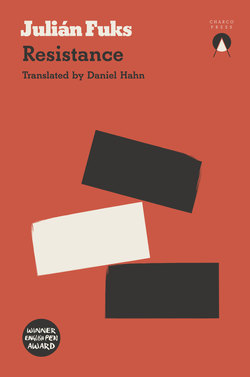Читать книгу Resistance - Julián Fuks - Страница 10
На сайте Литреса книга снята с продажи.
Оглавление4.
How strong is silence when it stretches well beyond the immediate discomfort, well beyond the hurt. For years I’ve noticed, impressed, how my brother can quickly dismiss any thoughts that displease him, interrupt conversations without seeming abrupt, change the subject without even noticing, slip between one idea and another in a way that’s almost instantaneous, seamless. I see his face crumple for just a moment at some vague misfortune, some unhappy words that nobody ended up saying, a minuscule hint of or approach towards what’s bothering him, only to return to his normal expression, his indifference, his anaesthetised neutrality. There is no shortage of clues to suggest he has managed to forget, though forget isn’t quite the right word – repress is what my parents would say here, I can tell. There’s no shortage of evidence that he spends long periods without admitting it even to himself, without accepting or recognising it – days, months, maybe years, locked away in his room without any of this overwhelming him, without his mind being revisited by everything that I don’t want to say and cannot say, everything that I need to say. And has he no need to say it to himself?
How strong is silence when it stretches well beyond, I ask myself, well beyond the immediate discomfort, and the hurt, but also well beyond blame, and finally I come to my answer. I too, for a long time, have been able to forget. We are in the car again, now it’s a long journey and the tiredness is affecting us almost as much as the boredom, the heat, the frustration, and here once again I seem to be trying to justify my callousness, my foolishness. For some reason I’m annoyed at my sister, I don’t want to be sitting next to her any more, sharing the space and the journey with her, but I’m forced to and this makes me desperate: I’m not your brother. I announce that I am not her brother and she gets indignant, you can’t do that, you are my brother, that’s just how it is, you’re my brother and you’re going to be my brother forever. I insist, I don’t want to, you’re not my sister and that’s that, it’s decided, I’ve decided. She appeals to my father, who acknowledges quite reasonably that she’s in the right, stifling a laugh, and my mother agrees and she laughs too, amused at the absurdity of it all, at the extent of my stubbornness. No verdict means anything to me at that moment: I don’t care, to hell with you all, I’m not her brother and that’s that.
The anecdote has become a family classic, repeated over dinner even when all those present have heard it before, as a general example of childish folly or as proof of my excessive obstinacy. It’s always recounted in the cheerful tone that the two of them in front, my parents, assign to it. Two of us who were sitting in the back also take on this same tone, we also remember the episode as something funny, even seeing it as contributing to the complicity that we managed to establish between us.
But there were five of us in the car. My brother didn’t comment, and he still doesn’t today, preferring to stay silent at his corner of the table, simply swallowing what’s left of his meal, withdrawing earlier and earlier. I was sitting in the middle, between my sister and him, and I must have turned my back on him as I argued, doing my best to defend my impossible position. I don’t know how this effort of mine must have sounded to his ears, if he was pleased to hear how little I valued blood ties, or if it was painful to hear how precariously I treated fraternal bonds. I didn’t question whether he was my brother, our relationship was not something I wanted to disrupt. But I wonder whether he didn’t, all the same, just for a moment, frown, lower his eyes, his little boy’s face crumpling.
